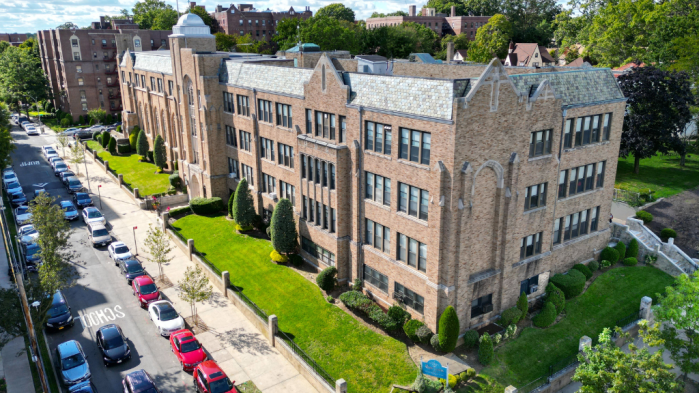Despite the citys looming financial crisis, Queens Borough President Helen Marshall delivered a confident State of the Borough address at Queens College on Wednesday, January 22, brimming with optimism about the past years achievements under the "Marshall Plan."
Hundreds of city officials, politicians, and Queens activists and luminaries including Astoria native Tony Bennett packed the cavernous auditorium in the Colden Center to hear Marshalls first annual address.
The borough president highlighted two general areas of focus for her administration: "physical infrastructure" and "human infrastructure."
"There are no gold mines or oil wells in our city," she said. "Our greatest resource is our people.
"A society is not only judged by bricks and mortar, but by the value it places on how we protect and educate our young, attract growing families, and provide for our seniors."
Although the September 11 attacks and the economic downturn have hurt Queens in many ways, Marshall listed a string of advancements in the boroughs physical aspects economic development, transportation, parks and cultural institutions.
On the economic front, Queens has seen several expanding "regional hubs," such as the opening of a major retail complex in downtown Jamaica and extensions of the Queens Center Mall.
Marshall is working for the revitalization of Willets Point in Flushing, calling the area now covered with junkyards a "vital" part of her larger plans.
The dismal performance of the aviation industry after 9/11 has been a drag on the Queens economy, leading to the loss of thousands of jobs, but Marshall claimed that a "resurgence" is in the works, with JetBlue Airlines coming to the borough and two cargo operations, Air-Riss and Continental, expanding at JFK airport.
The boroughs roads are safer and they will soon be cleaner, she said.
"Queens Boulevard has seen a dramatic decrease in pedestrian injuries and tragedies where fencing, slip ramps and traffic signals have been implemented."
Marshall also recently brought together the Transportation, Sanitation, and Parks Departments to start a "coordinated clean-up of the center malls on our major thoroughfares."
The "human infrastructure" has not fared as well. Homelessness has skyrocketed throughout the city, and the limitations of the shelter system are clearly visible in Queens.
"Last year, I had some heart-wrenching moments," said the borough president. "Very few were as difficult as witnessing the plight of the people now living in non-traditional housing at the former Best Western Hotel."
The Carlton House, which became the largest family shelter in the city when it opened in South Ozone Park last summer, has been plagued by a rash of problems. Marshall arranged for an asthma van from New York University Hospital to visit the shelter twice a week.
But the economic downturn has not led to a reversal of the downward trend in city and boroughwide crime rates, and Marshall praised the "dedication" of the NYPD.
She also recognized one member of the Police Department for his role in combatting crime. Sean, a 100-pound German shepherd with the K-9 unit, has helped apprehend seven suspects in the last two years and saved the life of the victim in the recent gang rape in Flushing Meadows-Corona Park.
"Sean, take a bow and have a bone," Marshall told the dog when his partner, Officer Kim Fletcher, brought the sizeable animal on stage. The audience broke out with a thunderous round of applause.
In education, the borough has made gains, with 12 new school openings and 10 additions planned for next year.
"We are making progress, but we are still woefully short and we still need another 20,000 seats."
The private sector has become a source of alternative funds for the public school system, she said. The "Take the Field" program, for instance, has led to the renovation of sports facilities at many Queens high schools, with some funds coming from Marshalls office.
Another private contributor to public schools was on hand world renowned entertainer Tony Bennett, who has been instrumental in the creation of the new Frank Sinatra High School for the Performing Arts.
"Coming from Astoria, I am so thrilled to see this happen," said Bennett, after Marshall invited him up to the stage. "So many great performers have come from our community."
The Frank Sinatra choir, the next generation of performers from Queens, gave a stirring rendition of "God Bless America," after a group of students from PS 166 sang Neil Diamonds "Coming to America" while dressed as immigrants from a century ago.
Marshall honored several other Queens residents, including Jonathan Grassi, a Howard Beach resident and student at Cornell University who signed up hundreds of organ donors as part of an Eagle Scout Project, and two "personal heroes," Clarence Irving and Julius Elderstein, who both have had distinguished careers in public service.


































